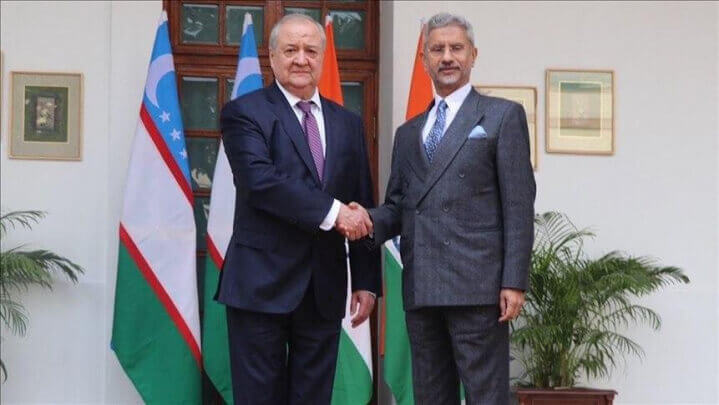The 2nd India-Central Asia Dialogue was held via video conference on 28 October and was chaired by Indian External Affairs Minister S. Jaishankar. The Foreign Ministers of Tajikistan, Kazakhstan, Uzbekistan, Turkmenistan, and the First Deputy Foreign Minister of Kyrgyzstan attended the meeting, and the Acting Foreign Minister of Afghanistan was invited as a special guest.
To begin with, the Ministers assessed their first meeting, which was held in the Uzbek city of Samarkand in January 2019. Following this, a formal platform aimed at strengthening economic, commercial, political, humanitarian, cultural, and security cooperation between the five Central Asian countries and India was established. The participating parties hope to build a comprehensive and sustainable partnership on the basis of historical and civilizational bonds, affirm a joint front against the coronavirus, and continue traditionally-close dialogues between their people.
The most notable outcome of the Wednesday meeting was the provision of a US $1 billion Line of Credit to Central Asian countries by New Delhi for development projects in the fields of connectivity, IT, energy, healthcare, agriculture, and education. The Ministers also welcomed Jaishankar’s offer to provide assistive grants for the execution of High Impact Community Development Projects (HICDP) to further regional socio-economic development. The leaders then welcomed the February inauguration of the New Delhi-based India-Central Asia Business Council (ICABC), which is a consortium that comprises of the chambers of commerce and industry of all involved countries. In addition, they stressed the importance of the ICABC as a B2B body to promote concerted efforts at expanding and incentivizing trade, business, and investment, especially for Small and Medium Enterprises (MSMEs).
To enhance people-to-people contact, the Ministers highlighted the importance of increasing connectivity and developing the transport and transit potentials of their countries. They expressed their interest to continue improving regional logistics networks and promoting joint projects to create transport corridors in the region. The Central Asian representatives appreciated New Delhi’s efforts in modernizing the infrastructural integrity of Iran’s Chabahar Port, which would be a crucial trade and transport link between South and Central Asian markets.
Further, the Ministers denounced all forms of terrorism and reaffirmed their commitment to fighting it and destroying funding networks and channels for terrorist activity occurring on their soil. “The ministers strongly condemned terrorism in all its forms and manifestations and reaffirmed the determination of their countries to combat this menace by destroying terrorist safe-havens, networks, infrastructure and funding channels. They also underlined the need for every country to ensure that its territory is not used to launch terrorist attacks against other countries,” said their joint statement. This is crucial, since analysts have noted these very regions as emerging sources of Islamic State fighters.
Lastly, the Ministers welcomed Afghan participation in the Dialogue and called for an “Afghan-led, Afghan-owned, and Afghan-controlled peace process” in the country. They expressed their commitment to strengthening cooperation to assist with economic and developmental reconstruction in Afghanistan, especially in the fields of infrastructure, energy, and connectivity.
The Central Asian leaders conspicuously avoided talks on the ongoing Nagorno-Karabakh conflict between their neighbours Azerbaijan and Armenia, which is causing regional instability and introducing foreign players like Turkey into the region.
Second India-Central Asia Dialogue Concluded
The countries pledged to end terror financing, support an Afghan-led peace process, and enhance trade and investment ties.
October 30, 2020

Indian EAM S Jaishankar and Uzbek FM Abdulaziz Kamilov. SOURCE: KUN.UZ
